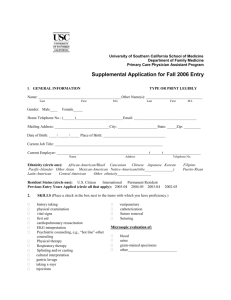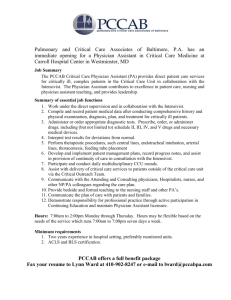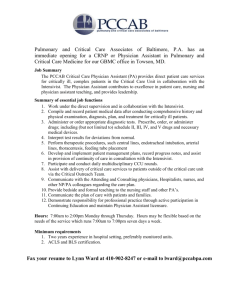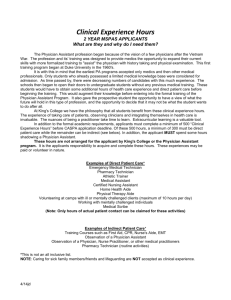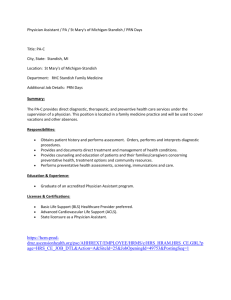THOMAS JEFFERSON UNIVERSITY DEPARTMENT OF PHYSICIAN ASSISTANT STUDIES PHYSICIAN ASSISTANT PROGRAM
advertisement
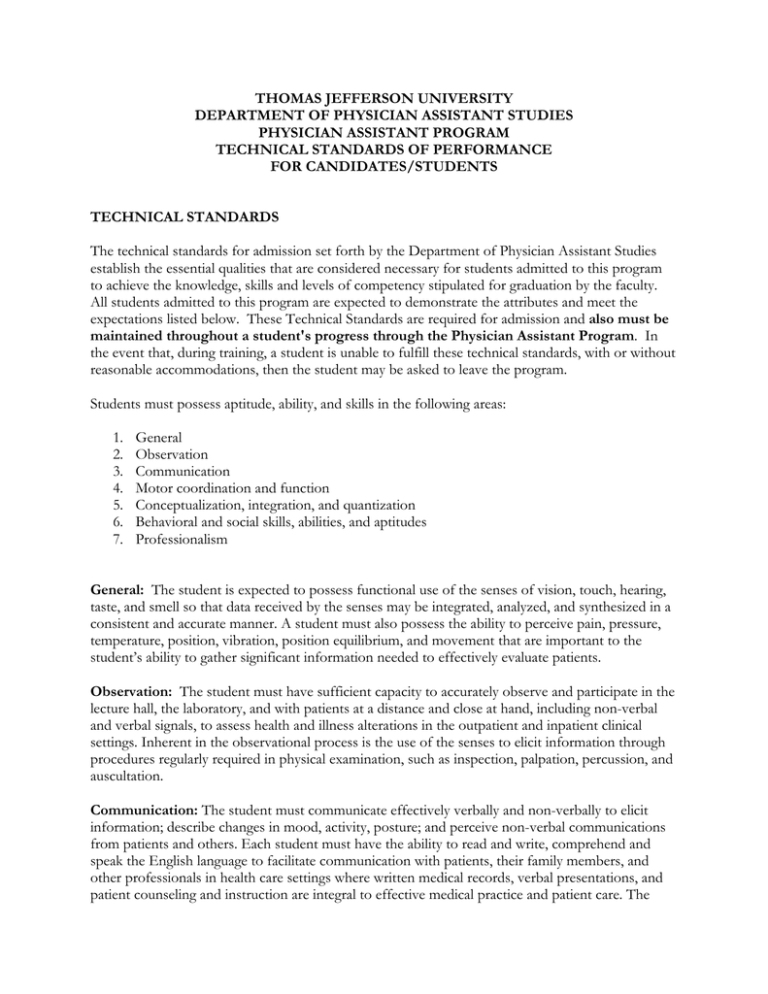
THOMAS JEFFERSON UNIVERSITY DEPARTMENT OF PHYSICIAN ASSISTANT STUDIES PHYSICIAN ASSISTANT PROGRAM TECHNICAL STANDARDS OF PERFORMANCE FOR CANDIDATES/STUDENTS TECHNICAL STANDARDS The technical standards for admission set forth by the Department of Physician Assistant Studies establish the essential qualities that are considered necessary for students admitted to this program to achieve the knowledge, skills and levels of competency stipulated for graduation by the faculty. All students admitted to this program are expected to demonstrate the attributes and meet the expectations listed below. These Technical Standards are required for admission and also must be maintained throughout a student's progress through the Physician Assistant Program. In the event that, during training, a student is unable to fulfill these technical standards, with or without reasonable accommodations, then the student may be asked to leave the program. Students must possess aptitude, ability, and skills in the following areas: 1. 2. 3. 4. 5. 6. 7. General Observation Communication Motor coordination and function Conceptualization, integration, and quantization Behavioral and social skills, abilities, and aptitudes Professionalism General: The student is expected to possess functional use of the senses of vision, touch, hearing, taste, and smell so that data received by the senses may be integrated, analyzed, and synthesized in a consistent and accurate manner. A student must also possess the ability to perceive pain, pressure, temperature, position, vibration, position equilibrium, and movement that are important to the student’s ability to gather significant information needed to effectively evaluate patients. Observation: The student must have sufficient capacity to accurately observe and participate in the lecture hall, the laboratory, and with patients at a distance and close at hand, including non-verbal and verbal signals, to assess health and illness alterations in the outpatient and inpatient clinical settings. Inherent in the observational process is the use of the senses to elicit information through procedures regularly required in physical examination, such as inspection, palpation, percussion, and auscultation. Communication: The student must communicate effectively verbally and non-verbally to elicit information; describe changes in mood, activity, posture; and perceive non-verbal communications from patients and others. Each student must have the ability to read and write, comprehend and speak the English language to facilitate communication with patients, their family members, and other professionals in health care settings where written medical records, verbal presentations, and patient counseling and instruction are integral to effective medical practice and patient care. The student must communicate effectively verbally and in writing with instructors and other students in the classroom setting, as well. Motor coordination and function: The student must be able to perform gross and fine motor movements with sufficient coordination needed to perform complete physical examinations utilizing the techniques of inspection, palpation, percussion, and auscultation, and other diagnostic maneuvers. A student must develop the psychomotor skills reasonably needed to perform or assist with procedures, treatments, administration of medication, management and operation of diagnostic and therapeutic medical equipment utilized in the general and emergent care of patients required in practice as a physician assistant. The student must be able to maintain consciousness and equilibrium; have sufficient levels of postural control, neuromuscular control, and eye-to-hand coordination; and to possess the physical and mental stamina to meet the demands associated with extended periods of sitting, standing, moving, and physical exertion required for satisfactory performance in the clinical and classroom settings. Conceptualization, integration, and quantization: The student must be able to develop and refine problem-solving skills that are crucial to practice as a physician assistant. Problem solving involves the abilities to comprehend three-dimensional relationships and understand the spatial relationships of structures; to measure, calculate reason, analyze, and synthesize objective and subjective data; and to make decisions that reflect consistent and thoughtful deliberation and sound clinical judgment. A student must have the capacity to read and comprehend medical literature. Each student must demonstrate mastery of these skills and the ability to incorporate new information from peers, teachers, and the medical literature to formulate sound judgment in patient assessment and diagnostic and therapeutic planning. Behavioral and social skills, abilities, and aptitudes: Flexibility, compassion, integrity, motivation, effective interpersonal skills, and concern for others are personal attributes required of those in physician assistant practice. Personal comfort and acceptance of the role of a dependent practitioner functioning under supervision is essential for training and practice as a physician assistant. The student must possess the emotional health required for full utilization of the student’s intellectual abilities; the exercise of good judgment; the prompt completion of all responsibilities in the classroom setting, as well as those in the clinical setting attendant to the diagnosis and care of patients; and the development of mature, sensitive, and effective relationships with patients and other members of the health care team. Each student must have the emotional stability required to exercise stable, sound judgment and to complete assessment and interventional activities. The ability to establish rapport and maintain sensitive, interpersonal relationships with individuals, families, and groups from a variety of social, emotional, cultural and intellectual backgrounds is critical for practice as a physician assistant. The student must be able to tolerate physically taxing loads and still function effectively under stress; adapt to changing environments; display flexibility; graciously accept constructive criticism; manage difficult interpersonal relationships during training; and learn to function cooperatively and efficiently in the face of uncertainties inherent in clinical practice. Professionalism: A candidate/student must consistently display honesty, integrity, respect for self and others, tolerance, caring, fairness, and dedication to their patients, peers, PA faculty and staff, TJU faculty and staff, the community and the PA profession. In compliance with Section 504 of the Rehabilitation Act of 1973, the Americans with Disabilities Act of 1990, and applicable federal and state laws, Thomas Jefferson University ensures people with disabilities will have an equal opportunity to participate in its programs and activities. Members and guests of the Jefferson community who have a disability need to register with the Office of Student Life, if requesting auxiliary aids, accommodations, and services to participate in Thomas Jefferson University’s programs. All requests for reasonable and appropriate auxiliary aids, academic adjustments, and services will be considered on a case-by-case basis and in a timely fashion. Office of Student Life 130 South 9th Street, Room 1120 Edison Building Philadelphia, PA 19107 (215) 503-8189 StudentLife@jefferson.edu
